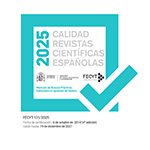Rasgos básicos y transformaciones en el servicio doméstico en una ciudad periférica. A Coruña, 1900-1960
Abstract
In this paper a preliminary analysis of the basic features and transformations of a low qualification activity —domestic service—, is carried out, in a town located in the Spanish economic periphery. The method follows the use of the population census as the main source, but trying to put the analysis into the local and regional socio-economic context, and comparing it with the evolution of this type of employment at the national and international level. The main strokes were not essentially different from those of the other Spanish towns and cities, although the high presence of domestic service within a predominantly tertiary economic structure was an outstanding feature. The servants were mostly young women, almost always single, coming from the nearby rural environment, and with low level of education, who used domestic service as the first, sometimes the only, alternative to improve their precarious economic situation.Downloads
Article download
License
In order to support the global exchange of knowledge, the journal Cuadernos de Historia Contemporánea is allowing unrestricted access to its content as from its publication in this electronic edition, and as such it is an open-access journal. The originals published in this journal are the property of the Complutense University of Madrid and any reproduction thereof in full or in part must cite the source. All content is distributed under a Creative Commons Attribution 4.0 use and distribution licence (CC BY 4.0). This circumstance must be expressly stated in these terms where necessary. You can view the summary and the complete legal text of the licence.











